人教版新目标2017届九年级中考英语初三总复习教案教学案
- 格式:doc
- 大小:182.50 KB
- 文档页数:40
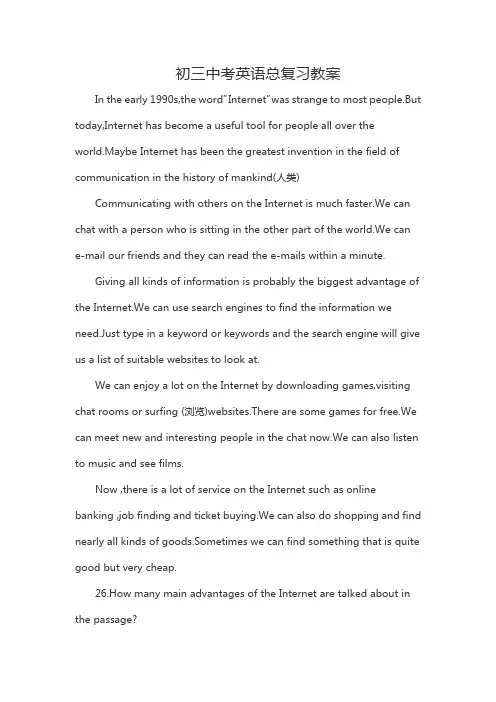
初三中考英语总复习教案In the early 1990s,the word”Internet”was strange to most people.But today,Internet has become a useful tool for people all over the world.Maybe Internet has been the greatest invention in the field of communication in the history of mankind(人类)Communicating with others on the Internet is much faster.We can chat with a person who is sitting in the other part of the world.We can e-mail our friends and they can read the e-mails within a minute.Giving all kinds of information is probably the biggest advantage of the Internet.We can use search engines to find the information we need.Just type in a keyword or keywords and the search engine will give us a list of suitable websites to look at.We can enjoy a lot on the Internet by downloading games,visiting chat rooms or surfing (浏览)websites.There are some games for free.We can meet new and interesting people in the chat now.We can also listen to music and see films.Now ,there is a lot of service on the Internet such as online banking ,job finding and ticket buying.We can also do shopping and find nearly all kinds of goods.Sometimes we can find something that is quite good but very cheap.26.How many main advantages of the Internet are talked about in the passage?A.Three.B.Four.C.Five.D.Six.27.What fact doesn’t the passage provide?A.We can find almost anything we want to know on the Internet.B.Some games on the Internet are free.C.We can buy most things we need on the Internet.D.Goods on the Internet are more expensive than those in real shops.28.Which title best gives the main idea of the passage?A.Online ShoppingB.Exchanging Information on the InternetC.The Advantages of the InternetD.Surfing the Websites on the Internet答案: BDCYou want to know about my staying in America,right?Well,to tell you the truth,it is really an eye-opening experience study here.In China,I had English classes five times a week since fifthgrade.However,I didn’t know how different textbook English could be from everyday English until I came to Hotchkiss School,Conmecticut.When I first studied English,I was told to say, “I am fine.”when people say “How are you ?”But in the US,I found that people say, “I am good.”or “Ilm tired.”One day ,someone greeted me with “What’s up ?”It ,made me confused.I thought for a moment and then smiled because I didn’t know what to say.Since then,I have discovered more and more differences between Chinese and US cultures.To my surprise,US girls spend a lot of time in the burning sun to get a tan.However ,in China ,girls try every possible way to get their skin paler,or “whiter.”I also surprised by how hard-working .US students are.InChina,schoolwork is almost everything ,so we study hard and that’it.But here,a “good”student gets good grades,does a lot for the public and plays sports or music.The kids here are so talented ,I am starting to be sorry that I gave up playing the piano at an early age and that I have never thought about sports.61.According to the writer,textbook English is _________everyday English.A.quite different fromB.the same asC.more difficult than62.What does the word “tan ”in the sixth paragraph mean in Chinese?A晒黑B晒白C 能量63.A good US student spends his/her time ________.A.only in doing homeworkB.only on sports or musicC.on studies ,sports or music and public work64.Which of the following is NOT true?A.The writer is now in US.B.American girls love to have white skin. students are talented and hard-working.65.Which is the best title for the passage?A.My Own Travel in the USB.My Studying in the USC.My Opinion about the US答案:AACBBPeople often say that the Englishman’s home is his castle.They mean that the home is very important and personal to him.Most people in Britain live in houses rather than flats,and many people own their homes.This means that they can make them individual(个体的);they can paint them,and change them in any way they like.Most house have a garden,even if it is a very small one,and the garden is usually loved.The house and the garden are the private(私人的)space of the individual.People usually like to mark their space.Are you sitting now in your home or on a train?have you marked the space around yourself asyour?If you are on the train you may put your coat or small bag on the seat beside you.If you share a flat you may have one corner or chair which is your own.Once I was travelling on a train to London.I was in a section for four people and there was a table between us .The man on the space on my side of the table at all. I was angry.Maybe he thought that he owned the whole table.I had read a book about non-verbal communication,so I took various papers out of my bag and put them on his briefcase!When I did this he stiffened and his eyes nearly popped(瞪出)out of his head.I had invaded(侵犯)his space!A few minutes later I took my papers off his case in order to read them.He immediately moved his case to his side of the table.Of course,it is possible that he just wanted to be helpful to me!If you are visiting another country you may feel that you don’t have any private space.Hotel rooms look much the same in every country in the world.All day long ,you share public spaces with o ther pople.You see the local people in their private spaces and you feel lonely and “outside”.Local people can create their private spaces by talking about things you don’t know about .And you even feel that they like you to be outside them so that they will enjoy being inside even more!This is one of the difficulties of being a traveler!But if you understand it then it helps you .Haven’t you enjoyed being part of a group and “owning”a bit of space?41.The writer was angry as he was travelling on a train to London because______.A.he had no place to sitB.someone had invaded his “space”C.too many people shared a section with himD.some other people talked about things he didn’t know about42. “…you feel lonely and ‘outside’”in paragraph 4 means that_______.A.you are alone outside the houseB.you feel lonely because you travel on your ownC.you are alone and therefore you go outside to have some funD.you feel lonely and you don’t belong to that place or that group of people43.In Paragraph 4 ,the pronoun “them’refers to(所指) “___________”.A.public spacesB.private spacesC.local peopleD.other countries44.Which of the following is TRUE according to the passage?A.British people dislike marking their space.B.You always feel at home in another country.C.Most British people prefer living in houses to flats.D.You can’t mark your private space in a foreign country.45.Tha main purpose of the passage is to tell readers to _______.A.own private spaces by living in housesB.have one corner of their own in public placesC.realize the importance of “space”in communicationD.create their private spaces by talking with local people 答案:BDCCC。
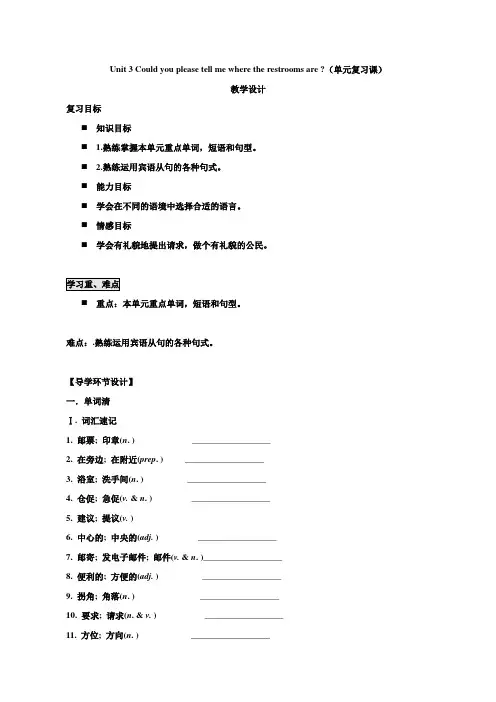
Unit 3 Could you please tell me where the restrooms are ?(单元复习课)教学设计复习目标⏹知识目标⏹ 1.熟练掌握本单元重点单词,短语和句型。
⏹ 2.熟练运用宾语从句的各种句式。
⏹能力目标⏹学会在不同的语境中选择合适的语言。
⏹情感目标⏹学会有礼貌地提出请求,做个有礼貌的公民。
学习重、难点⏹重点:本单元重点单词,短语和句型。
难点:.熟练运用宾语从句的各种句式。
【导学环节设计】一.单词清Ⅰ. 词汇速记1. 邮票; 印章(n. ) __________________2. 在旁边; 在附近(prep. ) __________________3. 浴室; 洗手间(n. ) __________________4. 仓促; 急促(v. & n. ) __________________5. 建议; 提议(v. )6. 中心的; 中央的(adj. ) __________________7. 邮寄; 发电子邮件; 邮件(v. & n. )__________________8. 便利的; 方便的(adj. ) __________________9. 拐角; 角落(n. ) __________________10. 要求; 请求(n. & v. ) __________________11. 方位; 方向(n. ) __________________12. 谁; 什么人(pron.13. 住址; 地址; 通讯处(n. ) __________________14. 地下的; 地铁(adj. & n. ) __________________15. 课程; 学科(n. ) __________________16. polite(adj. ) →__________ (adj. )不礼貌的; 粗鲁的→__________ (adv. )礼貌地; 客气地二.短语清Ⅱ. 短语互译1. get some information__________________2. between. . . and. . . __________________3. pardon me __________________4. 路过; 经过pass__ ______5. 向左/右转__________ left/right6. 要求; 请求ask________7. 停车场; 停车区________三.句型清Ⅲ. 句型攻关1. ——打扰一下, 请你告诉我在哪里兑换钱好吗?—__________ __________ , could you tell me__________ __________ __________ change some money?——当然。
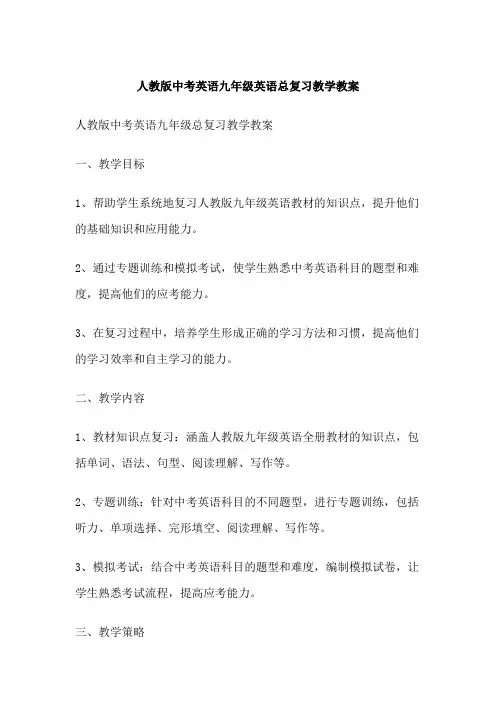
人教版中考英语九年级英语总复习教学教案人教版中考英语九年级总复习教学教案一、教学目标1、帮助学生系统地复习人教版九年级英语教材的知识点,提升他们的基础知识和应用能力。
2、通过专题训练和模拟考试,使学生熟悉中考英语科目的题型和难度,提高他们的应考能力。
3、在复习过程中,培养学生形成正确的学习方法和习惯,提高他们的学习效率和自主学习的能力。
二、教学内容1、教材知识点复习:涵盖人教版九年级英语全册教材的知识点,包括单词、语法、句型、阅读理解、写作等。
2、专题训练:针对中考英语科目的不同题型,进行专题训练,包括听力、单项选择、完形填空、阅读理解、写作等。
3、模拟考试:结合中考英语科目的题型和难度,编制模拟试卷,让学生熟悉考试流程,提高应考能力。
三、教学策略1、知识点复习:采用多种教学方法,如讲解、讨论、提问、练习等,使学生更好地掌握教材知识点。
2、专题训练:通过示范、实例分析、课堂讨论等方式,使学生掌握不同题型的解题技巧和策略。
3、模拟考试:在模拟考试中,引导学生按照考试要求和时间分配,培养他们的应考心态和策略。
四、教学评估1、课堂表现:观察学生在课堂上的表现,包括参与度、专注度、理解能力等。
2、作业和练习:检查学生完成作业和练习的情况,评估他们的学习效果和掌握程度。
3、模拟考试:分析学生在模拟考试中的表现,评估他们的应考能力和水平。
五、教学资源1、教材:人教版九年级英语全册教材。
2、教学软件:多媒体教学软件,包括教学PPT、视频、音频等。
3、学习网站:提供一些与中考英语复习相关的网站和资源,方便学生自行查阅和学习。
4、辅导材料:选择一些与中考英语相关的辅导材料,如习题集、模拟试卷等,供学生练习和提高。
六、教学进度安排根据中考时间安排和学生实际情况,可以将整个复习过程分为三个阶段:1、第一阶段:全面复习(2个月)。
按照教材章节顺序,系统地复习知识点,进行基础训练和专题训练。
2、第二阶段:强化训练(1个月)。
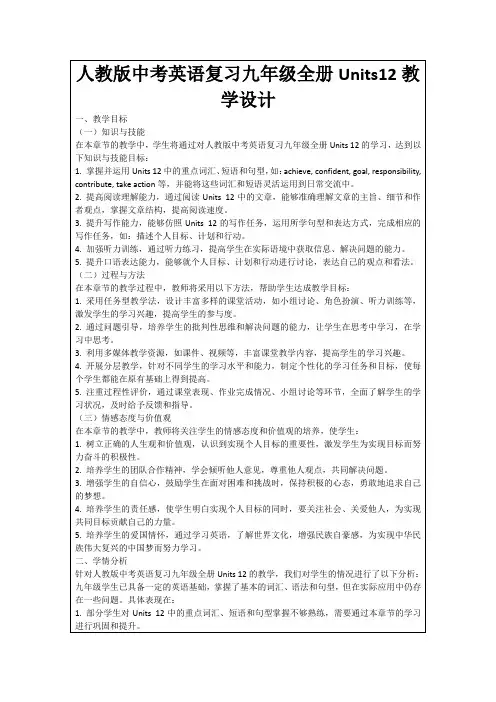
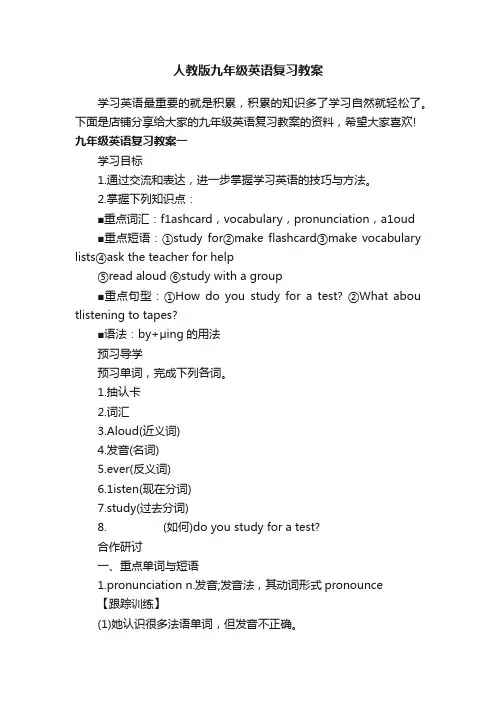
人教版九年级英语复习教案学习英语最重要的就是积累,积累的知识多了学习自然就轻松了。
下面是店铺分享给大家的九年级英语复习教案的资料,希望大家喜欢! 九年级英语复习教案一学习目标1.通过交流和表达,进一步掌握学习英语的技巧与方法。
2.掌握下列知识点:■重点词汇:f1ashcard,vocabulary,pronunciation,a1oud■重点短语:①study for②make flashcard③make vocabulary lists④ask the teacher for help⑤read aloud ⑥study with a group■重点句型:①How do you study for a test? ②What abou tlistening to tapes?■语法:by+μing的用法预习导学预习单词,完成下列各词。
1.抽认卡2.词汇3.Aloud(近义词)4.发音(名词)5.ever(反义词)6.1isten(现在分词)7.study(过去分词)8. (如何)do you study for a test?合作研讨一、重点单词与短语1.pronunciation n.发音;发音法,其动词形式pronounce【跟踪训练】(1)她认识很多法语单词,但发音不正确。
She knows a lot of French;words,but them incorrectl.2.Aloud adv.出声地;大声地例如:read aloud大声朗读【辨析】aloud/loud/loudlyaloud出声地;大声地。
常与read,cail等动词连用,loud高声地;大声地;喧闹地。
常用于talk,speak等动词之后;loudly高声地;喧闹地。
一般可以和10ud互换,但含有“吵闹”的意思。
【跟踪训练】(2)老师要求我大声朗读课文。
The teacher asked me to the text .(3)请大声点说,以便我能听清楚。
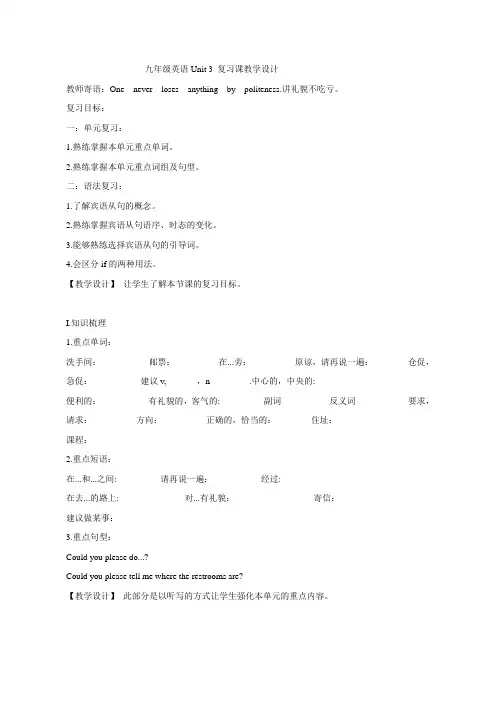
九年级英语Unit 3 复习课教学设计教师寄语:One never loses anything by politeness.讲礼貌不吃亏。
复习目标:一:单元复习:1.熟练掌握本单元重点单词。
2.熟练掌握本单元重点词组及句型。
二:语法复习:1.了解宾语从句的概念。
2.熟练掌握宾语从句语序、时态的变化。
3.能够熟练选择宾语从句的引导词。
4.会区分if的两种用法。
【教学设计】让学生了解本节课的复习目标。
I.知识梳理1.重点单词:洗手间:___________邮票:__________在...旁:__________原谅,请再说一遍:________仓促,急促:___________建议v,_______,n_________.中心的,中央的:____________便利的:___________有礼貌的,客气的:__________副词___________反义词____________要求,请求:__________方向:__________正确的,恰当的:________住址:_________课程:___________2.重点短语:在...和...之间:_________ 请再说一遍:___________经过:______________在去...的路上:______________ 对...有礼貌:__________________寄信:_____________建议做某事:_________________3.重点句型:Could you please do...?Could you please tell me where the restrooms are?【教学设计】此部分是以听写的方式让学生强化本单元的重点内容。
II.语法复习1.概念:①.宾语:指一个动作(动词)的接受者,常置于动词,介词之后,也有双宾语结构。
完成句子:我正在看电视。
I ______ _______ _________.他们对英语感兴趣。
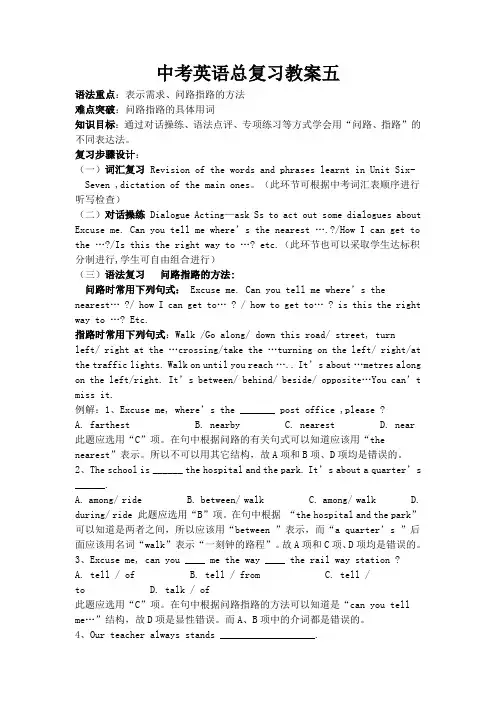
中考英语总复习教案五语法重点:表示需求、问路指路的方法难点突破:问路指路的具体用词知识目标:通过对话操练、语法点评、专项练习等方式学会用“问路、指路”的不同表达法。
复习步骤设计:(一)词汇复习Revision of the words and phrases learnt in Unit Six- Seven ,dictation of the main ones。
(此环节可根据中考词汇表顺序进行听写检查)(二)对话操练 Dialogue Acting—ask Ss to act out some dialogues about Excuse me. Can you tell me where’s the nearest ….?/How I can get to the …?/Is this the right way to …? etc.(此环节也可以采取学生达标积分制进行,学生可自由组合进行)(三)语法复习问路指路的方法:问路时常用下列句式:Excuse me. Can you tell me where’s the nearest… ?/ how I can get to…? / how to get to… ? is this the right way to …? Etc.指路时常用下列句式:Walk /Go along/ down this road/ street, turnleft/ right at the …crossing/take the …tu rning on the left/ right/at the traffic lights. Walk on until you reach ….. It’s about …metres along on the left/right. It’s between/ behind/ beside/ opposite…You can’t miss it.例解:1、Excuse me, where’s the _______ post office ,please ?A. farthestB. nearbyC. nearestD. near 此题应选用“C”项。
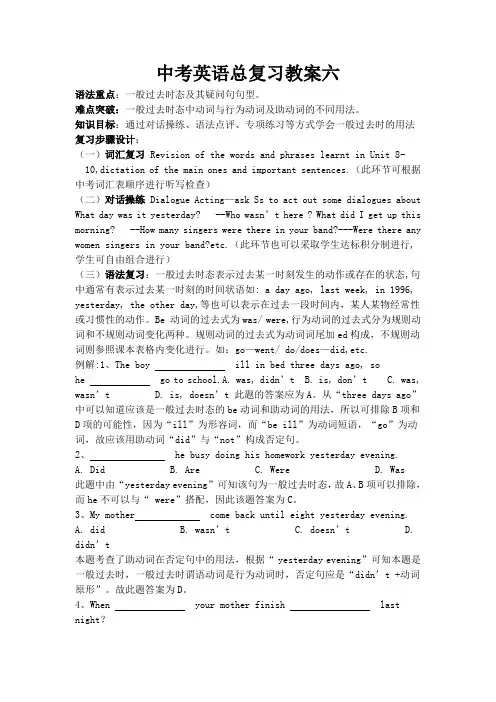
中考英语总复习教案六语法重点:一般过去时态及其疑问句句型。
难点突破:一般过去时态中动词与行为动词及助动词的不同用法。
知识目标:通过对话操练、语法点评、专项练习等方式学会一般过去时的用法复习步骤设计:(一)词汇复习Revision of the words and phrases learnt in Unit 8- 10,dictation of the main ones and important sentences.(此环节可根据中考词汇表顺序进行听写检查)(二)对话操练Dialogue Acting—ask Ss to act out some dialogues about What day was it yesterday? --Who wasn’t here ? What did I get up this morning? --How many singers were there in your band?---Were there any women singers in your band?etc.(此环节也可以采取学生达标积分制进行,学生可自由组合进行)(三)语法复习:一般过去时态表示过去某一时刻发生的动作或存在的状态,句中通常有表示过去某一时刻的时间状语如: a day ago, last week, in 1996, yesterday, the other day,等也可以表示在过去一段时间内,某人某物经常性或习惯性的动作。
Be 动词的过去式为was/ were,行为动词的过去式分为规则动词和不规则动词变化两种。
规则动词的过去式为动词词尾加ed构成,不规则动词则参照课本表格内变化进行。
如:go—went/ do/does—did,etc.例解:1、The boy ill in bed three days ago, sohe go to school.A. was, didn’t B. is, don’t C. was, wasn’t D. is, doesn’t 此题的答案应为A。
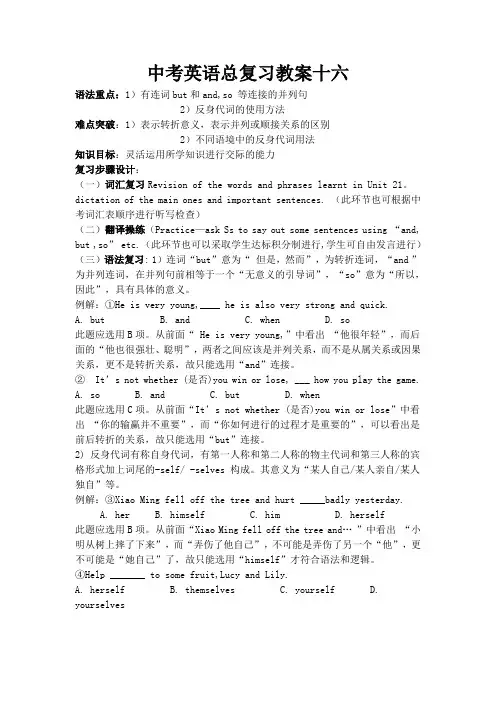
中考英语总复习教案十六语法重点:1)有连词but和and,so 等连接的并列句2)反身代词的使用方法难点突破:1)表示转折意义,表示并列或顺接关系的区别2)不同语境中的反身代词用法知识目标:灵活运用所学知识进行交际的能力复习步骤设计:(一)词汇复习Revision of the words and phrases learnt in Unit 21。
dictation of the main ones and important sentences. (此环节也可根据中考词汇表顺序进行听写检查)(二)翻译操练(Practice—ask Ss to say out some sentences using “and, but ,so” etc.(此环节也可以采取学生达标积分制进行,学生可自由发言进行)(三)语法复习: 1)连词“but”意为“ 但是,然而”,为转折连词,“and ”为并列连词,在并列句前相等于一个“无意义的引导词”,“so”意为“所以,因此”,具有具体的意义。
例解:①He is very young,____ he is also very strong and quick.A. butB. andC. whenD. so此题应选用B项。
从前面“ He is very young,”中看出“他很年轻”,而后面的“他也很强壮、聪明”,两者之间应该是并列关系,而不是从属关系或因果关系,更不是转折关系,故只能选用“and”连接。
②It’s not whether (是否)you win or lose, ___ how you play the game.A. soB. andC. butD. when此题应选用C项。
从前面“It’s not whether (是否)you win or lose”中看出“你的输赢并不重要”,而“你如何进行的过程才是重要的”,可以看出是前后转折的关系,故只能选用“but”连接。
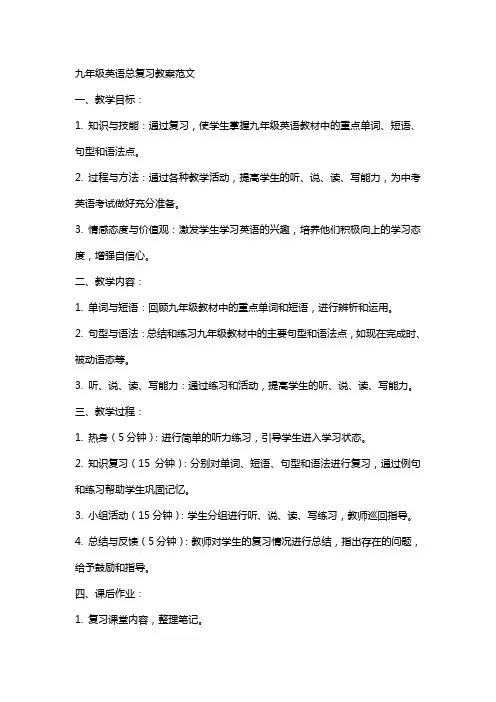
九年级英语总复习教案范文一、教学目标:1. 知识与技能:通过复习,使学生掌握九年级英语教材中的重点单词、短语、句型和语法点。
2. 过程与方法:通过各种教学活动,提高学生的听、说、读、写能力,为中考英语考试做好充分准备。
3. 情感态度与价值观:激发学生学习英语的兴趣,培养他们积极向上的学习态度,增强自信心。
二、教学内容:1. 单词与短语:回顾九年级教材中的重点单词和短语,进行辨析和运用。
2. 句型与语法:总结和练习九年级教材中的主要句型和语法点,如现在完成时、被动语态等。
3. 听、说、读、写能力:通过练习和活动,提高学生的听、说、读、写能力。
三、教学过程:1. 热身(5分钟):进行简单的听力练习,引导学生进入学习状态。
2. 知识复习(15分钟):分别对单词、短语、句型和语法进行复习,通过例句和练习帮助学生巩固记忆。
3. 小组活动(15分钟):学生分组进行听、说、读、写练习,教师巡回指导。
4. 总结与反馈(5分钟):教师对学生的复习情况进行总结,指出存在的问题,给予鼓励和指导。
四、课后作业:1. 复习课堂内容,整理笔记。
2. 完成课后练习题,提高听、说、读、写能力。
3. 准备下一节课的复习内容。
五、教学评价:1. 课堂表现:观察学生在课堂上的参与程度、发言情况和学习态度。
2. 课后作业:检查学生的作业完成情况,了解学生的学习效果。
3. 中考英语考试:关注学生的中考英语考试成绩,为后续教学提供参考。
六、教学策略:1. 采用归纳法进行语法复习,让学生通过具体例子理解并掌握语法规则。
2. 运用任务型教学法,组织学生进行小组合作,提高他们的实际运用能力。
3. 利用多媒体教学资源,如课件、视频等,增加课堂趣味性,提高学生的学习兴趣。
4. 针对学生的不同需求,给予个性化的辅导和指导,帮助他们在中考中取得好成绩。
七、教学重点与难点:1. 教学重点:九年级教材中的重点单词、短语、句型和语法点。
2. 教学难点:现在完成时、被动语态等语法点的运用和辨析。
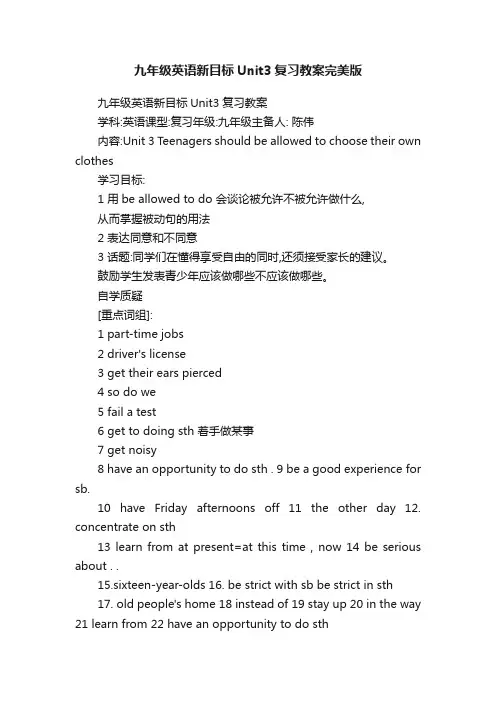
九年级英语新目标Unit3复习教案完美版九年级英语新目标Unit3复习教案学科:英语课型:复习年级:九年级主备人: 陈伟内容:Unit 3 Teenagers should be allowed to choose their own clothes学习目标:1 用be allowed to do 会谈论被允许不被允许做什么,从而掌握被动句的用法2 表达同意和不同意3 话题:同学们在懂得享受自由的同时,还须接受家长的建议。
鼓励学生发表青少年应该做哪些不应该做哪些。
自学质疑[重点词组]:1 part-time jobs2 driver's license3 get their ears pierced4 so do we5 fail a test6 get to doing sth 着手做某事7 get noisy8 have an opportunity to do sth . 9 be a good experience for sb.10 have Friday afternoons off 11 the other day 12. concentrate on sth13 learn from at present=at this time , now 14 be serious about . .15.sixteen-year-olds 16. be strict with sb be strict in sth17. old people's home 18 instead of 19 stay up 20 in the way 21 learn from 22 have an opportunity to do sth[重点句型]1. I think sixteen-year-olds should be allowed to drive2 Do you think thirteen-year-olds should be allowed to have part-time jobs ?3. Anna is allowed to wear her own clothes.4. They are not serious enough at that age.5 I'm not allowed to go out on school nights.点拨解疑:语法内容: 被动语态1."语态"表示主语和谓语动词之间的关系。
Review of the Passive Voice 教课方案I Teaching content自编复习教材(被动语态复习)II Teaching Aims and Damands1 Knowledge goals:How to write a sentence with the Passive Voice.2 Ability goals :Knowing when to use and how to use the Passive oiceV.3 Emotion and attitude goals:Learn by oneself with the teacher’s help and the help of lots of great examples.Love English and love studying.4 Strategy goals:Using what you know.5 Culture awareness goals:The differences between Chinese and EnglishIII Teaching key points1 The form of the Passive Voice.2 Write a sentence with the Passive oiceV.IV Teaching Difficult Points1 The verb “be”in the Passive Voice.2 Some special examples with the Passive oiceV.V Teaching MethodsTeaching by examples, practice and games.Learning by oneself with the help of the teacher and lots of examples. Offering help when it ’s necessary.VI Teaching AidsThe blackboard, a projector and a computer; PPT.VII Teaching procedures and waysStep1 Warming-upGreetings.T:Good morning, everyone. Today a great photographer will have the class together with us. He will make a video of our class. Isn’tit exciting? (Ss: Yes.) And I have some beautiful stars, I will give them to the students who will answer my questions. So let’s try our best to do well instead of being nervous, OK? (Ss: Yes.) Very good, let’s start.设计说明:给讲堂录像,学生一定会有紧张情绪。
中考英语总复习教案一、教学目标1. 知识点梳理:回顾和巩固中考英语考试范围内的重点语法、词汇、听力、阅读、写作等知识点。
2. 技能提升:提高学生的综合运用英语的能力,包括听、说、读、写四个方面。
3. 考试技巧:培养学生的应试策略,提高答题速度和准确率。
4. 心理辅导:帮助学生树立信心,调整心态,应对中考挑战。
二、教学内容1. 第六至第十单元知识点复习。
2. 重点语法点讲解与练习。
3. 词汇复习与运用。
4. 听力理解训练。
5. 阅读理解训练。
6. 写作技巧指导。
7. 模拟试题练习与讲解。
三、教学过程1. 课堂讲解:教师根据教材和复习计划,讲解重点知识点,引导学生回顾和巩固。
2. 课堂练习:教师布置针对性的练习题,学生当场完成,教师及时批改并讲解。
3. 课后作业:教师布置课后作业,要求学生巩固所学知识,提高自主学习能力。
4. 模拟考试:定期组织模拟考试,检验学生的复习效果,及时调整教学策略。
5. 心理辅导:教师与学生沟通,了解学生的心理状况,给予鼓励和支持。
四、教学评价1. 课堂参与度:观察学生在课堂上的活跃程度,参与课堂提问和讨论。
2. 练习完成情况:检查学生课后练习的完成质量,及时了解学生的学习情况。
3. 模拟考试成绩:分析学生的模拟考试成绩,评估复习效果。
4. 学生反馈:收集学生的意见和建议,不断优化教学方法和内容。
五、教学资源1. 教材:人教版《初中英语教材》。
2. 教辅资料:中考英语复习资料、模拟试题、语法点讲解等。
3. 教学设备:投影仪、电脑、黑板等。
4. 网络资源:英语学习网站、在线听力、阅读材料等。
六、教学策略1. 分类讲解:将知识点进行分类,有针对性地进行讲解,使学生更好地理解和掌握。
2. 案例分析:结合实际案例,让学生更好地理解和运用知识点。
3. 互动教学:鼓励学生积极参与课堂讨论,提高课堂氛围,提高学生的学习兴趣。
4. 小组合作:组织学生进行小组合作,互相学习,互相帮助,提高学习效果。
人教版中考英语九年级英语总复习教案课时授课计划授课日期___年___月___日星期___课时授课计划授课日期___年___月___日星期___课时授课计划授课日期___年___月___日星期___课时授课计划授课日期___年___月___日星期___课时授课计划授课日期___年___月___日星期___课时授课计划授课日期___年___月___日星期___课时授课计划授课日期___年___月___日星期___rain-______ 同义词_______, fog- ______, wind-______.It’s rainy. 同义句:There ________________ . 或It ___________________ .4.I’m pretty good ! 我很好!划线部分提问______ it ________? :你怎么样?(两人见面时)同义句:How____________________________ ?5. Some are taking photos, others are lying on the beach .一些人正在拍照, 另一些正躺在沙滩上。
Some …others …一些…, 另一些…造句:易混淆词组:1)one…the other …(两者中)一个…另一个…造句:2)another (三个或更多中的)另一个造句:6. I am surprised they can play in this heat . 是我吃惊的是他们能在这么热的天打排球。
1) be surprised at sth. 吃惊于某事…造句:2)be surprised to do sth . 吃惊的做…造句:3)to one’s surprised 是某人吃惊的是造句:III. 练习词汇1. It’s _______ / /(hotter) today than yesterday .2. She likes taking part in many different __________ /æk't v t z/.3. How was the ________/'weðə/ yesterday ?4. He ________ /'st d d/(studied) for the课时授课计划授课日期___年___月___日星期___。
(完整版)人教版新目标九年级英语全册学案及教学设计【经典】unit 1 How do you study for a test?一、教学目标1、语言目标1)询问别人的学习方法2)学习讨论各种学习方法和策略,学会评价各种学习方法的优劣2、知识目标1)How do you study for a test?I study by ving .2) the way to do sth the way of doing sthhave trouble doing sth 的用法3、能力目标1)通过讨论找到适合自己的学习方法,找出自己在英语学习中的困难2)学会给出关于学习方法的建议二、重点知识1、重点单词flashcard vocabulary aloud pronunciation memorize grammar frustrating quickly spoken pronounce mistakes challenge solution realize matter afraid complete impress trouble soft deal unless regard influence friendship development face 基本要求:会读、会写、会用。
2、重点短语make mistakes be afraid to do sth laugh at enjoy doing sth the way to do sth have trouble doing sth end upspoken English practice doing sth too much look upmake vocabulary lists try one`s best to do sth基本要求:会读、会写、会用。
3、重点语法1)How 引起的特殊疑问句及其回答2)the way to do sth the way of doing sthhave trouble doing sth 的用法基本要求:理解其含义,学以致用。
中考英语总复习教案一语法重点:一般现在时态 (Simple Present tense)难点突破:一般现在时态中第三人称时动词加“s”的用法知识目标:通过操练、点评、专项练习等方式复习“一般现在时态”的时态结构。
复习步骤设计:(一)词汇复习Revision of the words and phrases learnt in UnitOne,dictationof the main ones。
(此环节也可根据中考词汇表顺序进行听写检查)(二)对话操练Dialogue Acting—ask Ss to act out some dialogues aboutWhat do you usually do on Sundays/in the evening? (此环节也可以采取学生达标积分制进行,即复习阶段课前对话必须人人参与)(三)语法复习:一般现在时态:(A) 概念:表示某人/某事物经常发生的动作、习惯、状态等。
(B) 时态信号:常与sometimes, often, usually, always, every day, in the morning, on Sunday 等词连用。
(C) 动词形式:用实义动词原形,第三人称时用动词加“s”形式,简称“三单动s”形式,“Be”动词用“am/ is/ are ”的形式。
(D)情态动词后面直接加实义动词原形。
(E) 在某些动词后面须用动词原形进行搭配,如let sb do sth, You’d beterr do sth 等。
例解:1、Now let me ____ your names, OK?A. callB. to callC.calling D. calls此题应选用“A”项。
在“Let sb.”后面的结构中应该用动词原形结构,不可以用其它形式,所以B项、C项和D项都是错误的。
2、He ________ the washing on Sundays. He _____ it on Saturdays.A. doesn’t/ doesB. don’t do/does C. doesn’t do/ does D. not does/ does此题应选用“C”项。
Unit 1 How can we become good learners?学习目标认知目标:1. Talk about how to study. 学会讨论各种学习方法和策略。
2. Find out your suitable learning methods. 找出适合自己的学习方法。
情感目标:通过对学习方法的学习,培养学生用正确而科学的方法做事的能力,明白“一份耕耘,一份收获”。
技能目标:(1)熟练掌握下列词汇:aloud pronunciation discover repeat note pronounce increase speedpartner create active connect review knowledge wisely born attention (2)熟练掌握下列短语:work with friends ask the teacher for help read aloud look uppractice pronunciation connect…with… pay attention to (3)掌握下列句型:How do you study English? I learn by working with a group.Do you learn English by reading aloud? Yes, I do. It helps my pronunciation.How can I read faster? You can read faster by reading word groups.How can I improve my pronunciation? One way is by listening to tapes.But whether or not you can do this well depends on your learning habits.重点、难点(Key points and difficulties)1. 学会运用how来询问做事方式2. 学会运用by + doing的结构表达做事方式。
中考英语总复习教案一语法重点:一般现在时态 (Simple Present tense)难点突破:一般现在时态中第三人称时动词加“s”的用法知识目标:通过操练、点评、专项练习等方式复习“一般现在时态”的时态结构。
复习步骤设计:(一)词汇复习Revision of the words and phrases learnt in UnitOne,dictationof the main ones。
(此环节也可根据中考词汇表顺序进行听写检查)(二)对话操练Dialogue Acting—ask Ss to act out some dialogues aboutWhat do you usually do on Sundays/in the evening? (此环节也可以采取学生达标积分制进行,即复习阶段课前对话必须人人参与)(三)语法复习:一般现在时态:(A) 概念:表示某人/某事物经常发生的动作、习惯、状态等。
(B) 时态信号:常与sometimes, often, usually, always, every day, in the morning, on Sunday 等词连用。
(C) 动词形式:用实义动词原形,第三人称时用动词加“s”形式,简称“三单动s”形式,“Be”动词用“am/ is/ are ”的形式。
(D)情态动词后面直接加实义动词原形。
(E) 在某些动词后面须用动词原形进行搭配,如let sb do sth, You’d beterr do sth 等。
例解:1、Now let me ____ your names, OK?A. callB. to callC.calling D. calls此题应选用“A”项。
在“Let sb.”后面的结构中应该用动词原形结构,不可以用其它形式,所以B项、C项和D项都是错误的。
2、He ________ the washing on Sundays. He _____ it on Saturdays.A. doesn’t/ doesB. don’t do/does C. doesn’t do/ does D. not does/ does此题应选用“C”项。
在第三人称“He”为主语的否定句中应该用助动词“does ”加“not ”构成否定式,再加动词原形“do”,所以B项和D项是显性错误,而A项中“doesn’t”后面缺少动词原形,故也是错误的。
3、There _____ some pieces of paper on the desk.A. isB. areC. haveD. has此题应选用“B”项。
在以“There”为开头的句子中应该用“There be ”结构,不可以说“There have ”,所以C项和D项是显性错误,而A项中“is ”,把“paper”当成是单数了,而“some pieces of… ”表示了纸张的间接可数性,故A项也是错误的。
4、I _________ we can’t go. It’s going to rain. A. will hope B. will be afraid C. will think D. am afraid此题应选用“D”项。
在表示心理情感的词汇如“ like/hope/ wish/ think/ guess/be afraid/ be sorry/ be sure/be surprised”等不可以用将来时态,故只能用“am afraid”。
5、Paul ____ into the lift and the lift ____ him down to the first floor.A. gets/ tookB. got/ takesC. gets/ takes D got/ kept此题应选用“C”项。
在“and”前面与后面的结构中应该用动词相同的时态结构,不可以用一个过去时态和一个现在时态的形式,前后时态应该是统一的。
所以A项和B项是显性错误,而D项中的动词“kept”不符合句意,故也是错误的。
中考英语总复习教案二语法重点:一般将来时态(Simple Future tense)难点突破:be going to /will /shall 的区别使用知识目标:通过操练、点评、专项练习等方式复习“一般将来时态”的时态结构及用法。
复习步骤设计:(一)词汇复习Revision of the words and phrases learnt inUnitTwo ,dictation of the main ones。
(此环节也可根据中词汇表顺序进行听写检查)(二)对话操练Dialogue Acting—ask Ss to act out some dialogues about What are you going to do this Sunday / tomorrow? (此环节也可以采取学生达标积分制进行,学生可自由组合进行)(三)语法复习:一般将来时态:(A) 概念:表示某人/某事物即将发生(打算要做)的动作、状态等。
(B) 时态信号:经常与this evening, next week, tomorrow, in two years, soon 等词连用。
(C) 动词形式:用时态助动词“be going to ”或“will/shall”加实义动词原形构成。
“be going to ”常表示某人主观上打算,计划去做某事,大多情况下“will”与“be going to ”可以互换,但是“will更强调某人主观上的意愿和决心,而“shall ”则常与第一人称连用,表示征求对方的意见。
但是在表示既定的假日、年岁、日期等,不可以用“be going to/shall ”表示,应该用“will ”来表示。
例解:1、He _______ here for Shanghai next term. A. leaves B.left C. is leaving D. will be leaving此题应选用“C”项。
在此句中应该用动词的将来时态结构,所以A项和B项是显性错误,而D 项中的动词“will be going to ”把“will ”和“be going to ”两种将来时态结构同时用在了一处,所以D项是错误的。
2、Would you like to_____ a try again tomorrow ?A. havingB. haveC. hasD. will have此题应选用“B”项。
在此句中应该用动词短语“would like to do sth ”的搭配结构,而不可以用将来时态,所以D项是显性错误,而A项C项不是动词原形,所以也是错误的。
3、He _______ here for Shanghai next term.A. leavesB. leftC. is leavingD. will be leaving此题应选用“C”项。
在此句中应该用动词的将来时态结构,所以A项和B项是显性错误,而D项中的动词“will be going to ”把“will ”和“be going to ”两种将来时态结构同时用在了一处,所以D项是错误的。
4、Would you like to_____ a try again tomorrow ?A. havingB. haveC. hasD. will have此题应选用“B”项。
在此句中应该用动词短语“would like to do sth ”的搭配结构,而不可以用将来时态,所以D项是显性错误,而A项C项不是动词原形,所以也是错误的。
5、You’d better ____ your homework and ____ it here tomorrow.A. willfinish/bring B.finish/willbring C.finish/take D.finish/bring此题应选用“D”项。
在此句中“You’d better ”后面应该用动词原形“finish”的搭配结构,而不可以用将来时态,所以A项、B项是显性错误,而C项中动词“take it here ”为方向性错误,所以也是不可选用的。
6、____ the boy free tomorrow morning ?A. IsB. DoesC. AreD. Will此题应选用“A”项。
根据句中的“tomorrow morning ”可以知道应该用动词的将来时态形式,但是D项中缺少动词原形故是错误的,而“be free ”是动词短语,所以B项也是错误的。
故应该用A项“Is”。
在英语中表示已经事先安排好的计划时,可以用现在时态代替将来时态。
(四)巩固拓展:中考英语总复习教案三语法重点:形容词和副词的比较等级 (Comparison of adjectivesand adverbs)难点突破:(1)形容词、副词的原级、比较级、最高级的不同构成(2)原级、比较级、最高级的异同用法知识目标:通过操练、点评、专项练习等方式掌握“形容词、副词”的不同的级的结构及其用法。
复习步骤设计:(一)词汇复习Revision of the words and phrases learnt in Unit 3-4 ,dictation of the main ones。
(此环节也可根据中考词汇表顺序进行听写检查)(二)对话操练Dialogue Acting—ask Ss to act out some dialogues about Which do you like better, swimming or skating ? Who is taller?/ Who is the tallest ? Or Which do you like best, dogs, cats, or chickens ? etc.(此环节也可以采取学生达标积分制进行,学生可自由组合进行)(三)语法复习:1)形容词、副词的等级:原级、比较级、最高级。
2)构成方法:原级即形容词、副词原形不变,比较级在形容词、副词的词尾加-er构成,如果是多音节的词则在词前加-more,最高级在形容词、副词的词尾加-est构成,如果是多音节的词则在词前加-most 构成。
3)使用信号:原级为quite, rather, very, too, so, really, etc.比较级为强调词much, far, still ,a little, a bit, a lot, than ,etc.最高级为表示范围性质的短语如in … / of…/ among…, etc.例解:1、Lesson Five is ________ than Lesson Six in this book.A. many more interestingB. much interestingC.very interestingD. less interesting此题应选用“D”项。